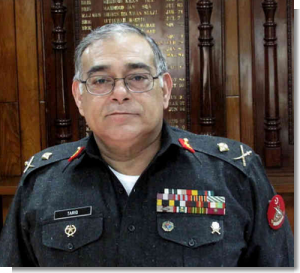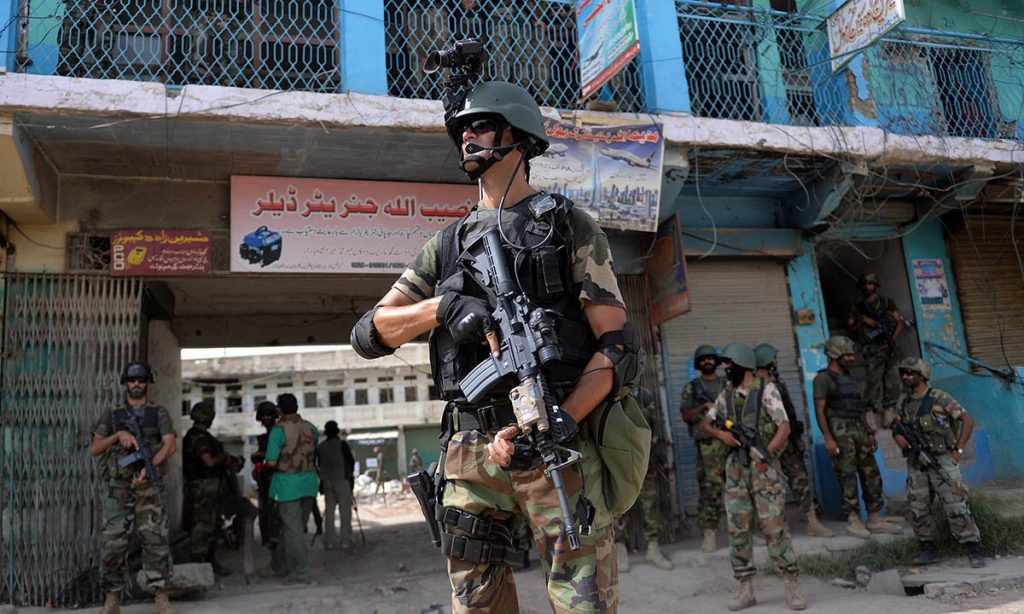“Terror is a created phenomenon with political motives.” Lt General (R) Tariq Khan,
By Sairah Irshad Khan | Interview | Published 8 years ago
 Sairah Irshad Khan is Senior Editor, Newsline, and a former bureau member of South Asians for Human Rights (SAHR).
Sairah Irshad Khan is Senior Editor, Newsline, and a former bureau member of South Asians for Human Rights (SAHR).
Lt General (R) Tariq Khan, Hilal-e-Imtiaz, was the Commander of 1 Strike Corps at Mangla
 Are we winning/losing the War on Terror?
Are we winning/losing the War on Terror?
If it’s the international scene that the question is related to, I have my reservations. The doubts in my mind stem from the fluid situation in Syria, the chaos in Yemen, Libya and Iraq, the open-ended conflict in Egypt and the confused one in Afghanistan, among many other aberrations world-wide. My reservations are due to violence sponsored to suit political agendas. UN Resolutions remain pending, the Palestinian situation remains unchanged, as does the Kashmir dispute, long-standing biases and prejudices still exist, and to date, not even a common definition for or understanding of terrorism as a phenomenon has been established. It appears everyone has his own views, depending which side of the fence he sits on. But the overriding concern for terrorism is itself disproportionate given the facts on the ground. Consider that under 75,000 lives have been lost to terrorism worldwide. Millions meanwhile, are lost to malnutrition, pollution, drug abuse and disease, but the great love for humanity professed by the powers-that-be, seem to have no plan to address this. This is why I am convinced that terror is a created phenomenon with political motives. It is not simply about communities going mad, or people just becoming extremists.
In regard to Pakistan and the War on Terror, it appears we are heading towards a positive closure albeit — in the distant future. The situation here needs to be measured against what it was in 2006. Then the Indus Highway was shut down; the Kohat Tunnel was blocked; the Peshawar International Airport was closed; the Khyber Pakhtunkhwa (KP) government was contemplating moving to Abbottabad, businesses in KP were relocating out of the province; Mohmand was a no-go area and accessible only by air; Bajaur was being governed by an Afghan commander flying an Afghan flag, using Afghan currency in the local revenue system; Swat had a local constitution and was governed by Sufi Mohammad; Buner was occupied by the Taliban and the Margalla Hills were threatened.
This is not the case today. Military action has cleared 48,000 square kilometres of combat zone, secured 3500 kms of lines of communication, and established the writ of the government in every area. One clear illustration of military success was when the army moved 2.5 million people out of their homes in the Swat Valley, relocated them in organised camps, cleared Swat of militancy and terrorism in an intense operation lasting three months, and moved all 2.5 million people back to their homes. This was an unprecedented feat without example in military history in any period.
Compare this to the three million Afghan refugees languishing in Pakistan since 1979, and the international community’s failure to rehabilitate them to date. The army’s other major success is in the fact that when this war started, we in Pakistan were fighting for our survival — it was that bad. Today, the militants are fighting for theirs. This is a strategic swing in our favour.
I had established a formula to measure military success in the region, and it was based on five questions my commanders had to answer: i) are you in control of the borders and do you have access to the region ii) have you established the writ of the government? iii) do you own the roads and the lines of communication? iv) do you own the nights? and v) finally, are you popular with the people.?
If they checked all the boxes, I was satisfied that we were making good progress. Having said that, I strongly feel that a decisive win against terrorism in Pakistan cannot be achieved only through military application. Military action can only create a conducive environment. But a true resolution of the issue lies in the fields of political integration, opportunity-building, development, economic sovereignty and the de-radicalisation of society. However, in these domains we have not done too well due to political instability, limited resources, corruption and hostile external agencies exploiting an atmosphere of intrusion developed by sectarian divide, ethnic conflict and provincial polarisation. I am certain that military successes can be built on by an assertive government, clear in its mind about what direction to take, to resolve the issues of violence, extremism and terrorism in Pakistan.
What are the most commonplace problems the forces conducting the anti-terror operations face?
Aggravations caused by a politicised police, a failed judicial system, constitutional anomalies, ideological interference in governance and corruption — these matters affect governance and the rule of law. The other problem is the lack of a narrative — people do not understand why they are being subjected to this war.
What are the most insurmountable obstacles they have to deal with?
There are no insurmountable problems so far; spaces have already been cleared and the people in various regions secured. But the main issue is dealing with the mindset, the obsession with ideology and the exploitation of faith by preachers and maulvis and their nexus with corruption.
Who is the most dangerous enemy among the myriad terrorist organisations in this theatre of war?
The continual waning and waxing of the existing militant organisations in Pakistan keeps them in flux and one cannot really say which is more violent or difficult to deal with at any one given time. Militant organisations splinter due to internal disagreements or rifts or because they have been effectively hit by counter-terrorism forces. Some morph into new ones. But generally, I would say, extremist elements are all dangerous.
How large and threatening is the presence of IS in Pakistan?
The IS threat at present is exaggerated. The ones calling themselves IS etc are the same people who have been militarily beaten and disparate elements of defeated groups who have regrouped, calling themselves a genuine Daesh and IS. However, there is a genuine Daesh and IS presence in Afghanistan, especially in the Nuristan and Kunar areas. They have deep affiliations with their Syrian leadership. If this is not contained, it will, in time, affect Pakistan as well.
How do you factor in Pakistan’s foreign policy imperatives in the war against terror? (Iran, Afghanistan, India and the US).
Iran and Saudi Arabia are using Pakistani territory to fight a proxy war which has a sectarian complexion. The US is influenced by Northern Alliance-inspired intelligence, the operatives of which have a six-month work turnover tenure, and as such, can never really come to grips with the area or the environment. The Northern Alliance is driven by hatred. They see Pakistan as supporters of the Taliban who, prior to 9/11, had decimated the Northern Alliance. This has led to a total breakdown in credibility and trust between the US and Pakistan. Afghanistan has a unity government, unique in its structure, but it does not represent the majority of the people who are Pashtuns. The Pashtuns have ties across the border in Pakistan and there is a general perception that this a just war because they have been marginalised. So Pakistan is considered to be aiding these factions and facilitating them. Pakistan does not have the capability or capacity to stop them from continuing to wage war, but these are small bands of fighters and surely the US ‘defeat’ in Afghanistan cannot be attributed to them. Pakistan gets blamed, but tactical reverses and operational setbacks cannot be as a result of anyone else other than the force that suffers that reverse. It is time to investigate these reverses.

On a scale of 1 to 10, how successful was Operation Zarb-e-Azb?
Its military activity was quite successful but it must be seen in the context of the overall picture. The entire combat zone involved space of up to 48,000 sq kms, and 35,000 sq kms of this were made up of South Waziristan, Kurram, Bajaur, Dir, Mohmand, Buner, Swat, Orakzai and Khyber etc. This was cleared by intense battles, with the military suffering 4000 causalities.
Zarb-e-Azb involved only North Waziristan, which amounted to 13,000 sq kms and took three years to clear. However, because there was no reciprocal sealing of borders by the Afghans or the US, it created a revolving door effect and the military operations led to capturing spaces but not accounting for the militants themselves. This allowed the militants to regroup and give themselves other fancy names such as IS or Jamaat-ul-Ahrar etc, and they are now responsible for the fresh spate of violence in the country. As for the non-military activity that was a part of Zarb-e-Azb, there was limited progress in NACTA as well as NAP and operations in Karachi became politicised with not a single person apprehended being tried and sentenced in court. On the other hand, Punjab remained untouched. There was a government-based resistance to operate in Punjab, which is also why we have had bombings all over the rest of the country. On a scale of 1 to 10, I would give Zarb-e-Azb a 3.
Is the Saudi Coalition Force to fight terrorism, comprising 30 or more countries, a good idea?
It does not even become an idea till it defines the objective, articulation of forces, their location, any sectarian preferences in recruitment, its area of responsibility, structure of the force, inclusion (or not) of the navy and the air force.
Given the huge global menace of terrorism, how would you advise the international community to address the War on Terror?
In my opinion there are four stakeholders in every country. First, it is the people who are the victims as well the targets in all terrorist activity. The second are the governments who are weak, incompetent and ignorant and are easily influenced by nuisance groups. Third are the intelligence agencies who are influencing their governments and brief them — the tail that wags the dog. These agencies are highly decentralised and unaccountable, they develop an agenda in their respective national interests and promote those agendas through violence. They hope to get favourable decisions for their own nations by competing with other agencies in creating havoc and chaos.
I do not believe in the term ‘non-state’ actor, all militancy is supported by someone or the other. States have chosen to continue war ‘by other means,’ and as such the nature and character of conflict has changed. It is no longer the age of invasion, amassing and concentrating large armies, etc.
I hold all intelligence agencies guilty of promoting this war by other means, where the totality of war is seen in its most ugly form while it is extended to people and communities and remains deniable. This is opposed to its limited application of the recent past where it was restricted between opposing militaries that had defined objectives and followed an escalation ladder which allowed opportunities to address the crisis at every stage.
The fourth, and last stakeholders are the respective field armies, who are now fighting a war which is confusing, lacking in objectivity and at times even a defined enemy, and directed by governments that don’t know better and who are influenced by their intelligence agencies. The answer, a utopian one, is to gather all the intelligence agencies, hold them accountable, and develop a proper supervisory mechanism to examine what they are up to. Without this, I see no hope that terrorism will ever be defeated internationally.
There is talk of conducting joint operations with Afghanistan against terrorism. Is this possible, given the mistrust between the two and the harbouring of anti-Afghan terrorists and anti-Pakistan groups within their respective borders?
No, it’s not possible. Just like it’s not possible to have neutral observers in Kashmir, it’s not possible to have joint operations with Afghanistan. In both cases it is easier to blame Pakistan to promote respective national interests. There are too many contradictions; on the one hand the Durand Line is disputed, and on the other hand Pakistan is blamed for not doing enough to manage it. Pakistan has four times the posts that the Afghan/US have across the line, but that still does not stop anyone from blaming us of cross-border activity, even when there is none, or it is very limited. So, when we see the immediate reality on ground, joint operations are a far cry. The propensity to blame it all on us and broadcast an image of Pakistan which shows us as the most dangerous country in the world has now, in fact, come full circle. Despite our sacrifices of over 6000 military personnel killed in action, the highest officer to troops ratio, the most generals killed in conflict, the greatest amount of Al Qaeda arrests, the largest space cleared, we have no standing at the end of this conflict. Our reputation destroyed, our credibility questioned, our capacity relegated, we no longer have the capability to be a useful ally.


